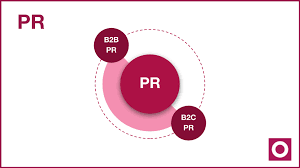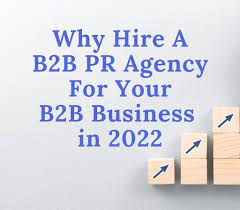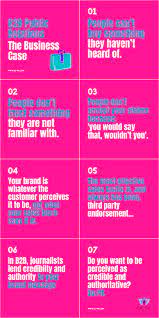Unlocking Success: The Impact of B2B Tech PR Strategies
The Power of B2B Tech PR: Building Strong Relationships in the Digital Age
In today’s fast-paced digital landscape, B2B technology companies face fierce competition and the challenge of standing out in a crowded market. This is where B2B tech PR comes into play, offering a powerful tool to help businesses connect with their target audience, build credibility, and drive growth.
What is B2B Tech PR?
B2B tech PR involves strategically managing communication between technology companies and their target audience, which can include other businesses, investors, industry influencers, and the media. The goal is to enhance brand visibility, establish thought leadership, and ultimately drive business success.
The Benefits of B2B Tech PR
Effective B2B tech PR can lead to a range of benefits for technology companies. By securing media coverage in relevant industry publications and online platforms, businesses can increase brand awareness and credibility. Thought leadership articles and expert commentary can position companies as industry leaders and go-to sources for information.
Building Strong Relationships
One of the key aspects of B2B tech PR is building strong relationships with key stakeholders. This includes journalists, bloggers, industry analysts, and influencers who can help amplify a company’s message to a wider audience. By nurturing these relationships through regular communication and providing valuable insights, businesses can increase their chances of securing positive coverage.
Adapting to Digital Trends
In today’s digital age, B2B tech PR has evolved to encompass a wide range of online channels and platforms. From social media engagement to content marketing strategies, technology companies must adapt their PR efforts to reach audiences where they are most active. Embracing digital trends such as video content, podcasts, webinars, and virtual events can help businesses engage with their target audience in meaningful ways.
Measuring Success
Measuring the success of B2B tech PR efforts is essential to understanding the impact on business goals. Key performance indicators (KPIs) such as media mentions, website traffic referrals from PR activities, social media engagement metrics, lead generation from PR campaigns, and overall brand sentiment can provide valuable insights into the effectiveness of PR strategies.
In Conclusion
B2B tech PR plays a crucial role in helping technology companies navigate the competitive landscape by building strong relationships with key stakeholders and leveraging digital channels to reach their target audience. By investing in strategic communication efforts that focus on building credibility and thought leadership within the industry, businesses can achieve long-term success in an ever-changing digital world.
Understanding B2B Tech PR: Importance, Benefits, and Measurement
- What is B2B tech PR and why is it important for technology companies?
- How can B2B tech PR help technology companies build credibility and thought leadership?
- What are the key benefits of implementing a B2B tech PR strategy for a technology business?
- How does B2B tech PR differ from traditional public relations in the technology sector?
- What are some effective ways to measure the success of a B2B tech PR campaign?
What is B2B tech PR and why is it important for technology companies?
B2B tech PR, or Business-to-Business technology Public Relations, is a strategic communication practice that focuses on managing relationships between technology companies and their target audience, which includes other businesses, investors, industry influencers, and the media. It plays a crucial role in enhancing brand visibility, establishing thought leadership, and driving business success for technology companies. B2B tech PR is important as it helps these companies to increase brand awareness and credibility through securing media coverage in relevant industry publications and online platforms. By positioning themselves as industry leaders and go-to sources for information through thought leadership articles and expert commentary, technology companies can build trust with their audience and stand out in a competitive market.
How can B2B tech PR help technology companies build credibility and thought leadership?
B2B tech PR plays a vital role in helping technology companies build credibility and establish thought leadership within their industry. By securing media coverage in reputable publications, sharing expert insights through thought leadership articles, and engaging with industry influencers, B2B tech PR can enhance a company’s reputation and position it as a trusted authority in the field. Through strategic communication efforts, technology companies can showcase their expertise, share valuable knowledge with their target audience, and differentiate themselves from competitors, ultimately strengthening their credibility and influence in the market.
What are the key benefits of implementing a B2B tech PR strategy for a technology business?
Implementing a B2B tech PR strategy for a technology business offers a multitude of key benefits. Firstly, it enhances brand visibility and credibility within the industry, helping the business stand out in a competitive market. Securing media coverage in relevant publications and online platforms can significantly increase brand awareness. Additionally, thought leadership articles and expert commentary can position the company as an authority in its field, attracting potential clients and partners. Building strong relationships with key stakeholders such as journalists, bloggers, and industry influencers through PR efforts can amplify the company’s message and reach a wider audience. Overall, a well-executed B2B tech PR strategy can drive business growth, establish trust with stakeholders, and ultimately contribute to long-term success in the technology sector.
How does B2B tech PR differ from traditional public relations in the technology sector?
In the realm of B2B tech PR, a commonly asked question revolves around the distinction between this specialised form of public relations and traditional PR within the technology sector. The key differentiator lies in the strategic focus of B2B tech PR, which is tailored to cater specifically to business-to-business technology companies. Unlike traditional PR that may have a broader audience reach, B2B tech PR targets a niche audience comprising industry professionals, investors, and decision-makers within the technology sector. This approach involves crafting communication strategies that highlight technical expertise, industry insights, and thought leadership to establish credibility and foster meaningful relationships within the business technology landscape. By honing in on these nuances, B2B tech PR sets itself apart by delivering targeted messaging that resonates with a more specialised audience for enhanced brand visibility and industry influence.
What are some effective ways to measure the success of a B2B tech PR campaign?
Measuring the success of a B2B tech PR campaign is vital for understanding its impact and effectiveness in achieving business goals. Some effective ways to measure the success of a B2B tech PR campaign include tracking key performance indicators (KPIs) such as media mentions, website traffic referrals from PR activities, social media engagement metrics, lead generation from PR campaigns, and overall brand sentiment. These metrics provide valuable insights into the reach, engagement, and impact of PR efforts, helping businesses evaluate the ROI of their communication strategies and make informed decisions to further enhance their B2B tech PR initiatives.









